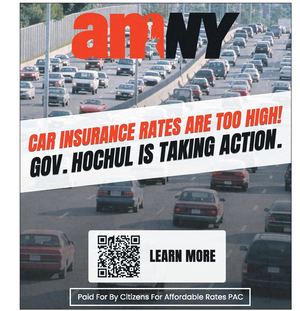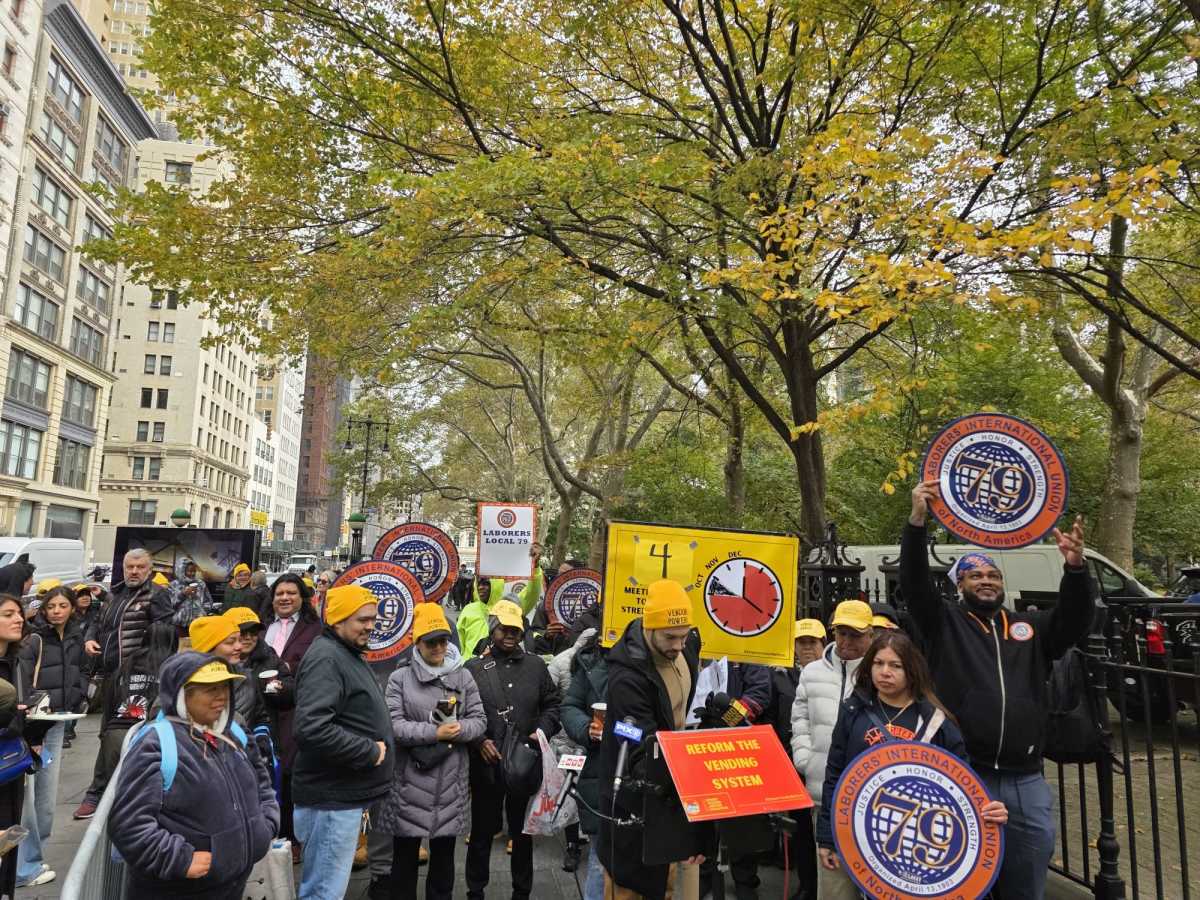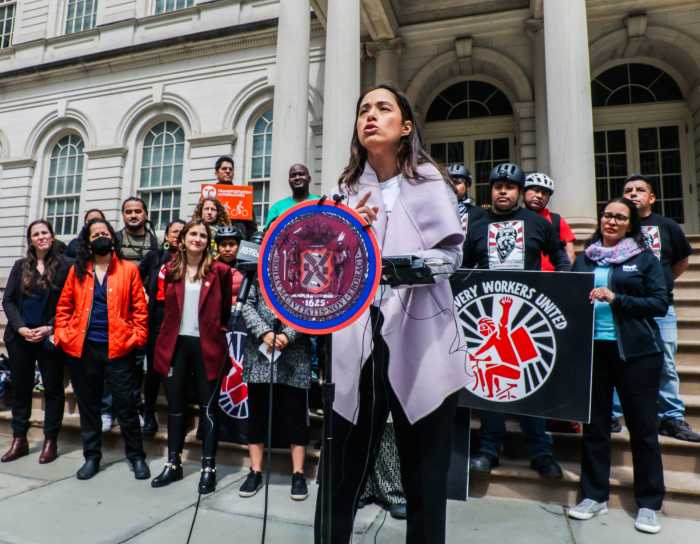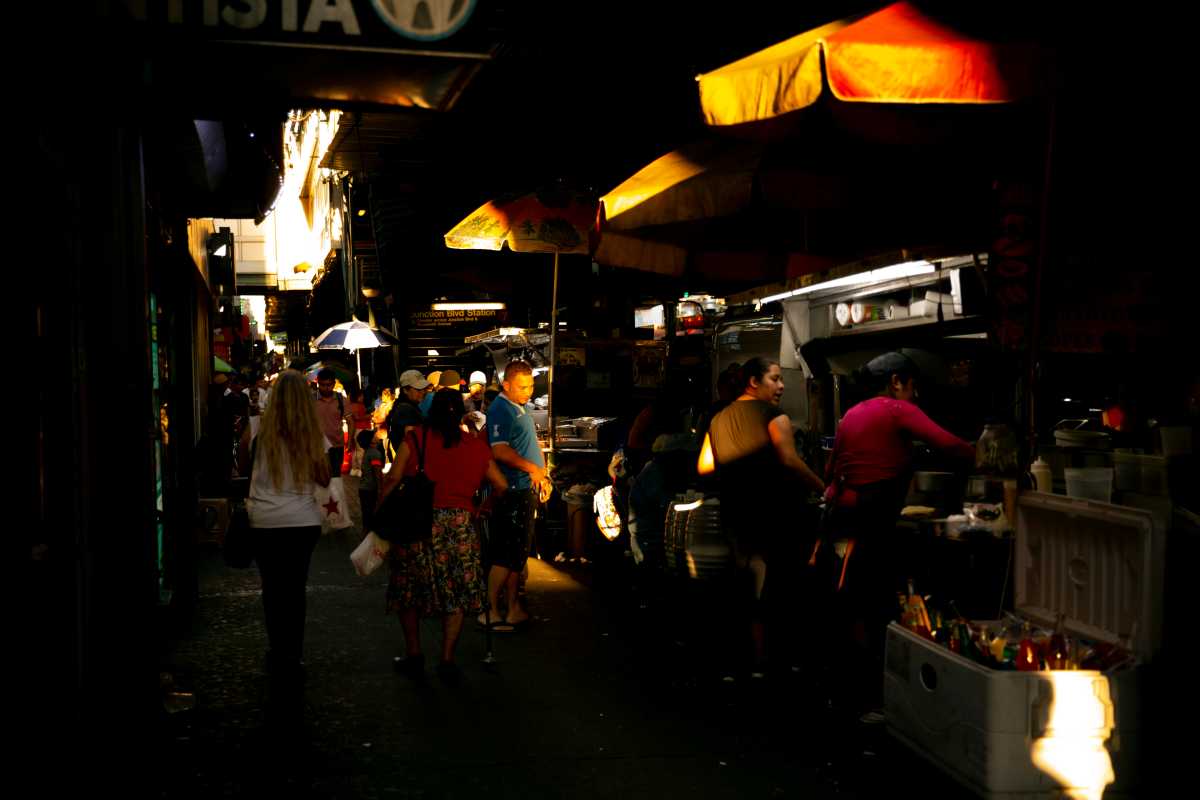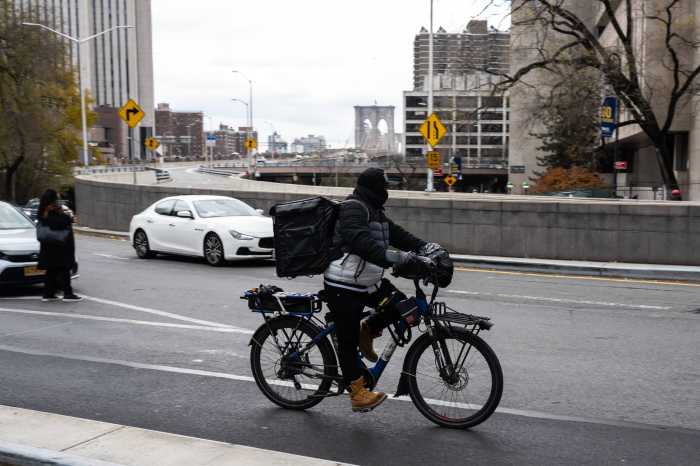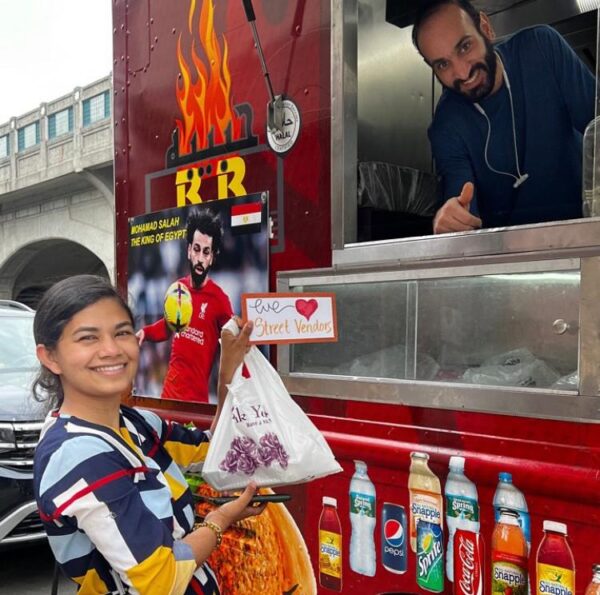More than 100 street vendors and delivery drivers rallied outside City Hall on Wednesday morning to urge the City Council to pass a package of legislation that would protect street vendors and halt “unjust” deactivations, which prohibit workers from using certain delivery apps.
The rally, organized by the Street Vendor Project, Workers’ Justice Project, Urban Justice Center, and Los Deliveristas Unidos, called on the Council to pass a number of bills known as the Street Vendor Reform Package before the end of the year.
The package, including Intros 431. 408, 24 and 1251, would ensure that all vendors have a “fair chance” to secure licenses for their businesses, advocates said. The package would further create a division within the NYC Department of Small Business Services, providing educational and compliance services for vendors and making conditions safer for both vendors and pedestrians alike, they added.
Protesters stated that it is currently impossible to obtain a permit from the city, as vendors are unable to join a lengthy and closed waitlist to secure a permit.
The Health Department stated that it has issued permits to 1,107 vendors since the introduction of Local Law 445 in 2022, which mandated that the city must make up to 445 permits available annually. The Health Department said it has made 4,822 permits available since the introduction of the law, more than double than it is legally required.
Permits ‘in name only’
However, protesters said the city is only issuing permits in “name only,” stating that the waitlist for permits remains closed to new vendors. They also said the law is “not sufficient” to cope with the extensive wait list, which stood above 10,000 in 2024.
Protester stated Wednesday that Intro 1251 would ensured that more permits are issued to vendors every year.
Delivery workers, meanwhile, have called for the passage of Intro 1332, which they say would end the practice of “unjust” deactivations on delivery apps. Workers said Wednesday that their accounts are often deactivated on delivery apps without a clear reason, devastating a predominantly immigrant workforce that relies on deliveries to make a living.
The legislation would require delivery apps to provide just cause or clear economic reasons for deactivating a worker’s account, as well as providing the necessary training so that delivery workers can adhere to the app’s rules and regulations.
Wednesday’s rally saw a large number of vocal protesters march around City Hall for over an hour, calling on the Council to vote on the Street Vendor Reform Package before the end of the current session, with only four stated meetings left in 2025.
Bronx City Council Member Pierina Ana Sanchez, lead sponsor of Intro. 431, which would increase the number of permits the city makes available every year, stated that current regulations have forced vendors across the city to “operate in the shadows” because they are unable to obtain a permit legally.
Sanchez, who did not attend Wednesday’s rally, said more than 80% of vendors in her council district in the Bronx currently operate without a license because they are unable to obtain a license. Sanchez said the city is currently failing to provide vendors with access to education on how to operate stalls safely, with no support on how to operate harmoniously within a certain community.
She said there is currently “no path to full compliance” with the law, even when a vendor is willing to do so.
“As the daughter and granddaughter of hardworking, resilient street vendors, I am committed to reforming this unjust and broken system,” Sanchez said in a statement. “NYC leaders must come together to address the broken system through legislative and administrative changes.”
One vendor’s struggle
Underscoring the difficulties of obtaining a permit, Guadalupe Sosa, a second-generation street vendor in Harlem, said it took her mother 23 years to get off the waitlist, which she was on, earlier this year. Sosa, who sells shaved ice and fresh fruit at her stall in Harlem, has not even been able to apply for the waitlist.
The City Council voted earlier in the year to decriminalize street vending, reducing the maximum fine that a vendor can receive for operating without a permit from $1,000 to $250.
But Sosa insisted that the fines can still be devastating for vendors throughout the city.
“I don’t think it’s that much of a help if we’re still going to keep on getting tickets,” she said. “They’re not criminal tickets, but they are still tickets that street vendors financially cannot pay for because we’re always getting targeted.”
A spokesperson for the City Council stated that the proposed legislation is currently undergoing a “deliberative” process, which allows for public input.
Council Member Justin Brannan, lead sponsor of Intro 1332, said the legislation is part of a “bigger fight for fairness” in the New York City economy. He said delivery apps have deactivated workers’ accounts after classifying some orders that took too long as “fraud” and accused apps of pressuring workers to “cut corners” and travel at an unlawful speed to keep their jobs.
Brannan cited the city’s new e-bike speed limits, which came into effect on Oct. 24 and limits e-bike speed to 15 mph in New York City, stating that delivery workers will be forced to compromise street safety in order to avoid having their accounts deactivated.
“Here in New York City, you don’t get to build billion-dollar empires on the backs of workers and then treat those workers like they don’t matter,” Brannan said. “We want these essential workers to know that we see them, we hear them, and we’ve got their back. This is part of a bigger fight for fairness in the gig economy.”
Delivery workers ‘don’t want to go out’
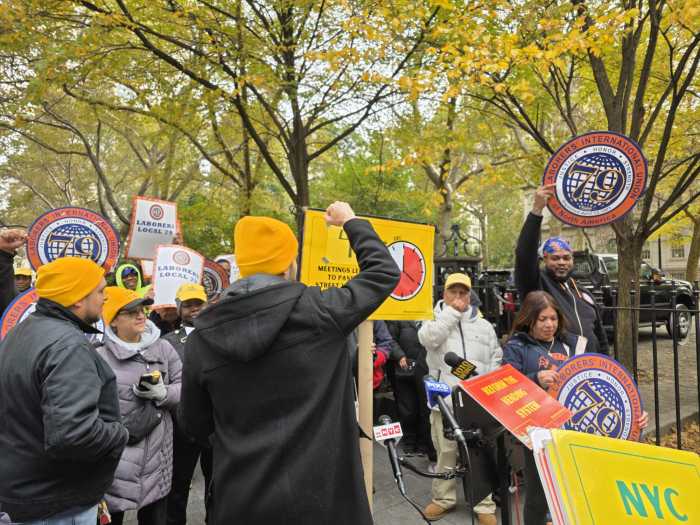
Wednesday’s rally also took place against the backdrop of a highly-publicized ICE raid in Chinatown last week, when a number of immigrant vendors were arrested on Canal Street on Oct. 21.
A number of protesters said Wednesday that they have noticed an uptick in fear among both vendors and delivery workers since President Donald Trump took office in January.
William Medina, a delivery worker and member of the Workers’ Justice Project, said Trump’s immigration agenda has created a “difficult situation” for the city’s majority immigrant delivery workforce.
“They (delivery workers) don’t want to go out,” Medina said.
Sosa, on the other hand, said she has seen a noticeable rise in fear among street vendors since Trump took office in January.
“Some of our street vendors are not working five days like they used to,” Sosa said. “Now they’re working less.”
She said last week’s ICE raid served as an “eye-opener” for the city’s vendor community.
A Council spokesperson said Intro 47-B, which decriminalized street vending, has helped reduce the exposure of immigrant vendors to ICE. However, the Council emphasized that the package of legislation currently making its way through the Council “cannot prevent the irresponsible actions by ICE.”
“The deployment of militarized federal agents on Canal Street did nothing to keep our communities safe, but was part of an effort to create fear and chaos in our City,” a Council spokesperson said in a statement. “Over the summer, the Council passed an important law to protect New Yorkers and reduce vendors’ risk of being targeted by ICE, overriding Mayor Adams’ veto.”
City Comptroller Brad Lander, meanwhile, said the “unjust punishment” of street vendors and delivery workers has left them at risk of targeting by ICE and called on the Council to pass the package of legislation.
“Street vendors and deliveristas are not just critical to the cultural and economic fabric of our city, they are our neighbors, and it’s time the Council takes up these bills to end the bureaucratic chaos and allow them to safely provide the services New Yorkers want without fear of xenophobic harassment,” Lander said in a statement.
